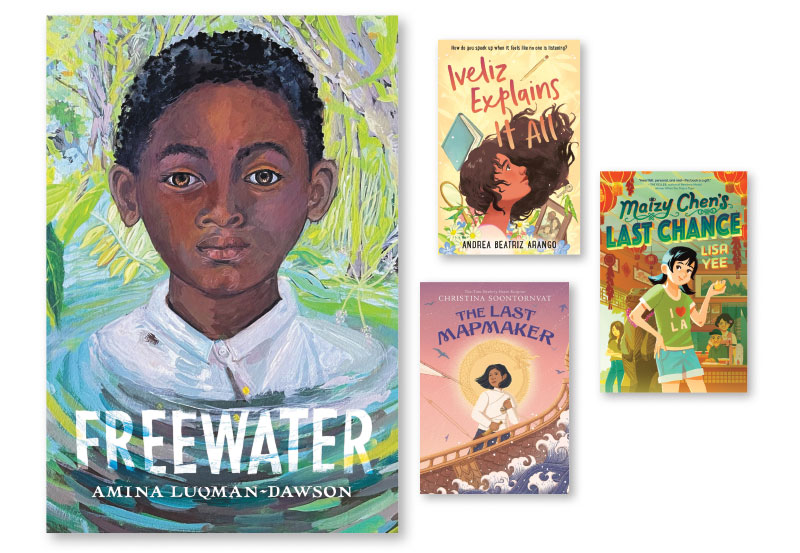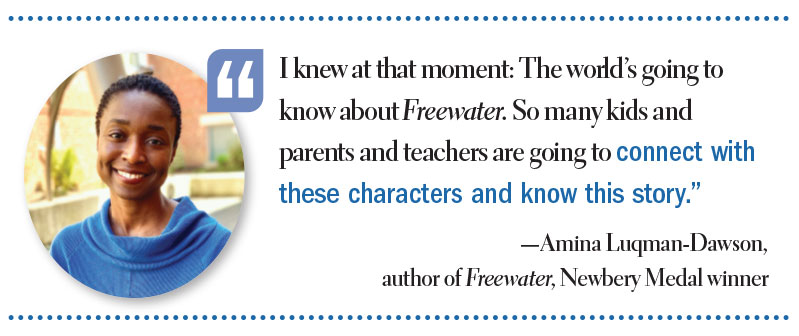Newbery Surprise: A Look at 2023 Winner 'Freewater' and 10 Seminal Titles in the Award’s History
SLJ's "Heavy Medal" bloggers are still putting Freewater's unexpected Newbery win into context, as they examine 10 past winners that made an impact.

The surprise Newbery winner was Amina Luqman-Dawson’s Freewater. Just when you think you know where the selection committee will land, sometimes books and authors seem to come out of nowhere and take the prize. Freewater had some support from “Heavy Medal” readers. We both read it and agreed it was excellent, but it never cracked our list of top contenders.
With the prestigious win, Luqman-Dawson became only the third person to take both the Newbery Medal and the Coretta Scott King Author Award in the same year, joining Jerry Craft and Christopher Paul Curtis. She also entered rarified air with her first children’s book earning the Medal. Only two other debut authors have won in the 21st century: Clare Vanderpool ( Moon Over Manifest, 2011) and Jerry Craft (New Kid, 2020).

With Freewater’s win and the 2023 Honor titles—Iveliz Explains It All by Andrea Beatriz Arango, The Last Mapmaker by Christina Soontornvat, and Maizy Chen’s Last Chance by Lisa Yee—the Newbery recognized a group of BIPOC authors. Luqman-Dawson is African American, Soontornat is Thai American, Yee is third-generation Chinese American, and Arango was born and raised in Puerto Rico. It was only the second time in history that there wasn’t a white author on the list.
As these books join the Newbery pantheon in the award’s 101st year, let’s take a look back at some seminal books from the award’s first century. (With a hat tip to Travis Jonker’s “10 Books That Changed the Way We See the Caldecott Medal,” for inspiring this trip through Newbery history.)
The Story of Mankind by Hendrick Willem van Loon
This is the one that started it all. Today, ALA’s Youth Media Awards feature more than a dozen awards. But when Hendrick Willem van Loon’s nonfiction title that explores the history of western civilization took the inaugural Medal in 1922, the Newbery was the first and only major children’s book award in the world. The Story of Mankind won by an impressive margin, receiving 75 percent of the votes cast by 212 members of ALA’s Children’s Library Section. Van Loon was the first of eight male authors in a row to win the Medal.
Bonus trivia: A 1957 film adaptation loosely based on The Story of Mankind featured Vincent Price and the Marx Brothers.
Charlotte’s Web by E. B. White
Who has read Secret of the Andes by Ann Nolan Clark? Anyone? What about Charlotte’s Web? Many remember 1953 as the year E. B. White was robbed of the Medal. Rumors still abound about why it failed in committee: that Charlotte’s death was too traumatic for a Medal, that one librarian’s scathing review clouded opinions, and that judges thought people just need to reread Andes, where a boy, Cusi, and his pet llama leave their home in the Andes to learn the mysterious secret of Cusi’s ancient ancestors. The truth is that we’ll never know the truth. The most revealing information we can find is that back in 1953, Honor titles were listed in vote order, not alphabetical; Charlotte did place second and beat out four other Honors for the spot. Still, this remains one of the most talked-about Newbery “upsets.” It’s proof that the committee is made of humans, and what goes on behind closed doors is a mystery.
M. C. Higgins the Great by Virgnia Hamilton
Virginia Hamilton made history throughout her career as an author and advocate for African American literature. In 1975, she became the first Black author to win the Newbery Medal for this realistic fiction title chronicling three eventful days in the life of an African American teenager. Unfortunately, it wasn’t followed by an increase in Newbery recognition for African American authors and novels. Roll of Thunder, Hear My Cry by Mildred Taylor took the Medal in 1977, and then it was a flood of white authors until the next century, when Curtis’s Bud, Not Buddy won in 2000.
Lincoln: A Photobiography by Russell Freedman
Between The Story of Mankind and Russell Freedman’s 1988 winner, Lincoln, only four informational books have won the Newbery Medal…and that’s if we include fictionalized biographies. In Lincoln, Freedman’s engaging prose, supported by pertinent quotations, carefully chosen photos, and impeccable research, set a new standard for award-winning children’s nonfiction. Since then, Medal books have been all fiction (plus one poetry collection, Joyful Noise by Paul Fleischman, in 1989). The influence of Lincoln’s triumph can be seen in other nonfiction Honor book recipients that followed, including Jim Murphy (twice, for The Great Fire, 1996, and An American Plague, 2004), Susan Campbell Bartoletti (Hitler Youth, 2006), and Steve Sheinkin (Bomb, 2013).
Out of the Dust by Karen Hesse
Karen Hesse’s 1998 Medal book tells the riveting story of a family’s struggle during the Dust Bowl, but unlike the 30 or so other historical fiction novels that had won Newbery Medals to that point, she tells her tale in free verse. It was an unusual (though not unprecedented) style choice at the time that has since become a frequently used literary form in youth literature. In the years after Out of the Dust’s win, nine more Newbery titles, including three in the past four years, have utilized free verse to tell their stories: five novels, one biography, a history book, and a memoir.
The Higher Power of Lucky by Susan Patron
The 2007 Medal winner was partly overshadowed by a media uproar concerning language on the first page of this novel by Susan Patron. The controversy centered on just one word. Ten-year-old Lucy hears the word “scrotum” through the wall, in reference to a rattlesnake biting a dog. According to media coverage from the New York Times, educators, booksellers, and outraged parents claimed the word was an attention-grab and inappropriate content for the readership age.
Last Stop on Market Street by Matt de la Peña
But it’s a picture book! Yes, it’s a picture book. Read this 2016 Newbery Medal winner, though, and the only response can be, “Wow! That truly is distinguished writing!” Last Stop was the first traditional picture book to win the Medal. It also became just the second title to win a Newbery Medal and a Caldecott Honor (for illustrator Christian Robinson) in the same year, after Nancy Willard’s A Visit to William Blake’s Inn in 1982. Matt de la Peña’s Newbery triumph opened the doors for other award worthy picture books, with four more titles earning Newbery Honors since 2018.
Hello Universe by Erin Entrada Kelly, plus the 2018 Honors
The entire 2018 Newbery lineup was a milestone: It was a sweep for diverse authors. The winner was Erin Entrada Kelly’s Hello Universe, while the Honor titles were Crown by Derrick Barnes, A Long Way Down by Jason Reynolds, and Piecing Me Together by Renée Watson. For the first time, not one of the recognized books was written by a white author. Diverse and inclusive representation had been issues with the Newbery for decades, so 2018 was a breakthrough. Since then, less than 20 percent of Medal and Honor books have come from white authors.
New Kid by Jerry Craft
But can a graphic novel actually win the Newbery Medal? Jerry Craft and the 2020 committee finally quieted the chatter that graphic novels aren’t real books and don’t have a place in the Newbery conversation. While graphic novels El Deafo by Cece Bell and Roller Girl by Victoria Jamieson won Honors previously, Craft’s story about a student of color at a prestigious private school broke the Medal barrier.
Too Bright to See by Kyle Lukoff and A Snake Falls to Earth by Darcie Little Badger
In 2022, the Newbery committee continued to expand representation with its recognition. In the lineup, two Honor titles—Too Bright to See by Kyle Lukoff and A Snake Falls to Earth by Darcie Little Badger—had clear LGBTQIA+ representation in key characters for the first time. Little Badger was also the first Indigenous author to win an Honor. The 2022 awards proved that there is always progress to be made and new ground to break. n
Steven Engelfried and Emily Mroczek-Bayci blog about the Newbery Medal at “Heavy Medal,” slj.com/heavymedal.
RELATED
The job outlook in 2030: Librarians will be in demand
The job outlook in 2030: Librarians will be in demand
ALREADY A SUBSCRIBER? LOG IN
We are currently offering this content for free. Sign up now to activate your personal profile, where you can save articles for future viewing





Add Comment :-
Be the first reader to comment.
Comment Policy:
Comment should not be empty !!!